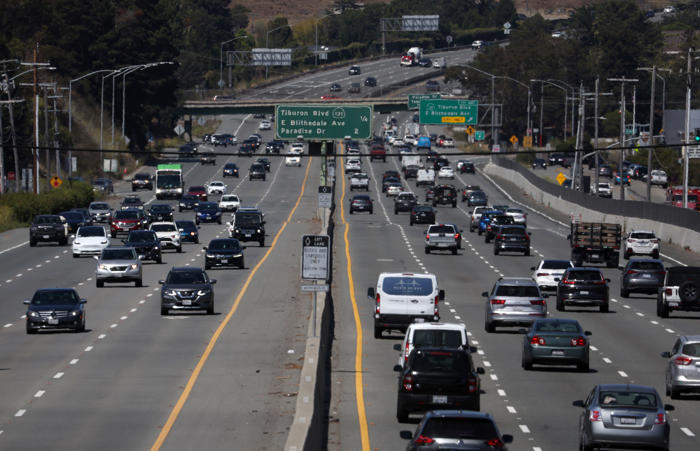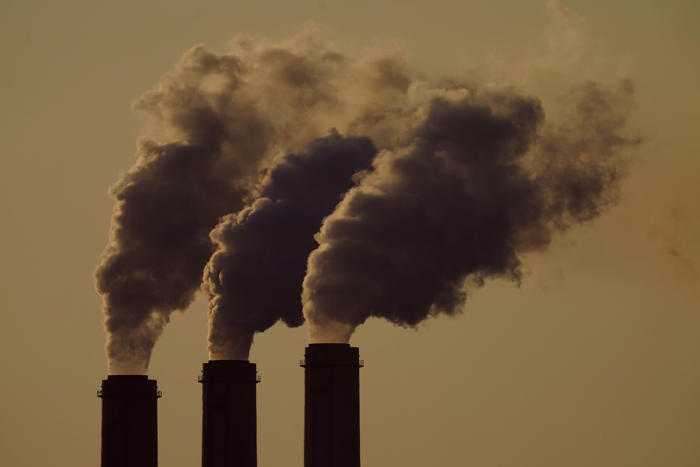How conservative judges secured a ‘chain saw’ to derail environmental rules

How conservative judges secured a ‘chain saw’ to derail environmental rules
Three years ago, President Biden promised to “deliver a whole-of-government approach to the climate crisis,” including by making half of all new cars electric by 2030.
Now the Supreme Court has imperiled that broad agenda — and possibly other climate and environment rules for decades to come.
In recent rulings, particularly two last week, the high court added obstacles to the government’s ability to regulate air pollution, water pollution and the greenhouse gases that are heating Earth. The decisions could empower conservative judges on lower courts throughout the country to block even more environmental regulations — not only under Biden but presidents who follow him.
The recent rulings are “especially valuable for conservative judges who are inclined towards striking down [environmental] regulations,” said Sam Sankar, senior vice president for programs at the environmental law firm Earthjustice. “They had a knife before; they have a chain saw now.”
On Thursday, the Supreme Court put on hold the Environmental Protection Agency’s plan for cutting industrial air pollution that wafts across state lines. On Friday, the justices overturned the so-called Chevron doctrine, severely limiting the power of federal agencies to regulate fundamental aspects of American life, including the environment. And court rulings in 2022 and 2023 targeted the EPA’s authority to curb greenhouse gases and to protect wetlands from runoff.
Together, the decisions underscore how a multiyear campaign by industry and conservative groups is successfully weakening the power of the administrative state, and the EPA in particular.
The rulings “will likely limit the Biden administration’s whole-of-government approach to climate change,” in which the EPA plays a central role, said Matthew Z. Leopold, an attorney at Hunton Andrews Kurth LLP who served as EPA general counsel under the Trump administration.
The decisions could constrain U.S. climate policy when rising temperatures are wreaking havoc around the globe. Scorching heat across five continents smashed 1,400 records last month, leaving tens of millions of people sweltering and hundreds reported dead.
While it may take time for the consequences of the rulings to become fully clear, the next four years will be especially consequential. If Biden is reelected, his major environmental rules could be even more vulnerable to legal challenges. If Trump wins a second term, he could appoint even more conservative judges who could continue winnowing environmental protections for decades.
Republican attorneys general and industry groups that supported the recent Supreme Court cases said they feel emboldened by the outcomes.
“We are a little further along today in our effort to dismantle the administrative state,” West Virginia Attorney General Patrick Morrisey (R) wrote Friday on X, adding, “Proud of my team for all of their outstanding work over the years to be a part of making this.”
Trump remade the U.S. judiciary, installing more than 220 federal judges, including almost as many powerful federal appeals court judges in four years as Barack Obama appointed in eight. He also appointed three Supreme Court justices — Neil M. Gorsuch, Brett M. Kavanaugh and Amy Coney Barrett — who have generally expressed deep skepticism about the power of environmental agencies.

Emissions rise from smokestacks at the Jeffrey Energy Center coal power plant near Emmett, Kan., on Sept. 18, 2021.
The decision Thursday, written by Gorsuch and joined by most of the court’s conservatives, could have the most immediate real-world impact. It effectively paused the EPA’s enforcement of limits on harmful air pollution that blows into downwind states from power plant smokestacks, pipelines and factories. The agency had estimated that the rule, known as the “good neighbor plan,” would have significant health benefits for residents of downwind states.
“In 2026 alone, EPA projected the final Good Neighbor Plan would prevent 1,300 premature deaths, avoid over 2,300 hospital and emergency room visits, reduce millions of cases of asthma symptoms and avoid hundreds of thousands of missed school days and tens of thousands of missed workdays,” EPA spokesman Timothy Carroll said in an email, adding that the agency believes the rule “is firmly grounded in its Clean Air Act authority.”
The ruling Thursday bodes poorly for the EPA’s ability to defend other major regulations from an onslaught of legal challenges, said Pat Parenteau, a professor of law emeritus at Vermont Law and Graduate School. He predicted that the EPA’s forthcoming limits on greenhouse gases from natural gas-fired power plants would be “really vulnerable” and “teed up for reversal.”
The Biden administration’s most consequential climate rule — the effort to boost sales of electric vehicles while slashing emissions from gasoline-powered cars and trucks — could also face a tough test in the courts.
Republican attorneys general from more than two dozen states have sued the EPA over the rules, arguing that the agency overstepped its authority with an attempt to transform the U.S. auto market. The top trade association for the U.S. oil and gas industry, which could see demand for its products decline as consumers shift to EVs, has also challenged the regulations in the U.S. Court of Appeals for the D.C. Circuit.
The EPA will need to convince the court that Congress empowered it to issue the rules, said Jeff Holmstead, a partner at the law and lobbying firm Bracewell LLP and a former top EPA official under President George W. Bush.
“The question is going to be, ‘Did Congress clearly intend to give EPA authority to force a fundamental shift in the transportation sector?’” Holmstead said. “And the answer may very well be that Congress can certainly do that itself, but there’s no indication that Congress intended to give EPA that power.”
The way Thursday’s decision was made was unusual: The justices took up the case on an emergency basis while it is still playing out in the D.C. Circuit. Normally, the high court waits for proceedings to finish in lower courts before weighing in.
The atypical process — and its outcome — could embolden the challengers of the EPA’s emissions limits for car and trucks, said Robert Percival, who directs the environmental law program at the University of Maryland.
“They know they’re probably going to lose in the D.C. Circuit, but they’re probably popping champagne with Leonard Leo right now, saying, ‘We’re going to be able to block this in the Supreme Court,’” Percival said, referring to the conservative legal activist and former vice president of the Federalist Society who has sought to remake the nation’s courts.
The long-term effects of overturning the Chevron doctrine are harder to predict but likely to be profound.
The doctrine — one of the most cited in American law — was established by the Supreme Court’s landmark 1984 ruling in Chevron U.S.A. v. Natural Resources Defense Council. It required courts to defer to federal agencies’ reasonable interpretations of ambiguous statutes.
The decision Friday to overturn Chevron is certain to spark a wave of lawsuits against the EPA and other federal agencies. When deciding these challenges, courts will no longer defer to the EPA’s interpretation of ambiguous parts of environmental statutes.
That could pose a major challenge for the agency in the absence of congressional action. The Clean Air Act and the Clean Water Act were both enacted more than 50 years ago, and Congress has passed few other environmental measures since then, even as the science of climate change has significantly advanced.
The “net effect” of Friday’s ruling “will be to weaken our government’s capacity to deal with the problems that the modern world is always throwing at us — big things like climate change or covid or the next pandemic,” said David Doniger, senior strategic director of the climate and clean energy program at the Natural Resources Defense Council, who argued the Chevron case.
Still, Congress did pass Biden’s signature climate law in 2022, giving the EPA more authority to curb planet-warming emissions, Doniger said. For the first time, the climate law, known as the Inflation Reduction Act, defined greenhouse gases as air pollutants that the EPA can regulate under the Clean Air Act.
Writing for the majority, Chief Justice John G. Roberts Jr. called Chevron “fundamentally misguided,” saying it gives agencies too much freedom to interpret Congress’s intentions. Roberts said his preference would be to give lower court judges the power to interpret statutes — even though environmentalists say these judges lack the technical expertise of agency scientists and regulators.
Gorsuch, in a concurrence with Roberts, sought to minimize the impact of Friday’s ruling, noting that the high court has not relied on Chevron in deciding cases over the past eight years. “All today’s decision means is that, going forward, federal courts will do exactly as this Court has since 2016, exactly as it did before the mid-1980s, and exactly as it had done since the founding: resolve cases and controversies without any systemic bias in the government’s favor,” he wrote.
The court’s three liberal justices — Sonia Sotomayor, Elena Kagan and Ketanji Brown Jackson — disagreed, with Kagan writing in their dissent that the conservative majority has amassed too much power for the judiciary.
“It is now the courts (rather than the agency) that will wield power when Congress has left an area of interpretive discretion, “‘’ Kagan wrote. “A rule of judicial humility gives way to a rule of judicial hubris.”
Carroll, the EPA spokesman, referred questions about Friday’s ruling to the White House, where press secretary Karine Jean-Pierre said in a statement that it is “yet another deeply troubling decision that takes our country backwards. Republican-backed special interests have repeatedly turned to the Supreme Court to block common-sense rules that keep us safe, protect our health and environment, safeguard our financial system, and support American consumers and workers.”
Jean-Pierre appeared to be referring to the network of conservative groups that has fought for years to topple Chevron. Many of these groups have received millions of dollars from the Koch network, founded by petrochemicals billionaire Charles Koch and his late brother, David Koch. Justice Clarence Thomas participated in two Koch donor summits as the Chevron case was on its way to the high court.
The justices are not done with their streak of environmental cases. During the next term beginning in October, the high court will take up a case that could limit the reach of the National Environmental Policy Act, the 1970 law that requires agencies to study the environmental impact of pipelines, highways and other infrastructure projects.
